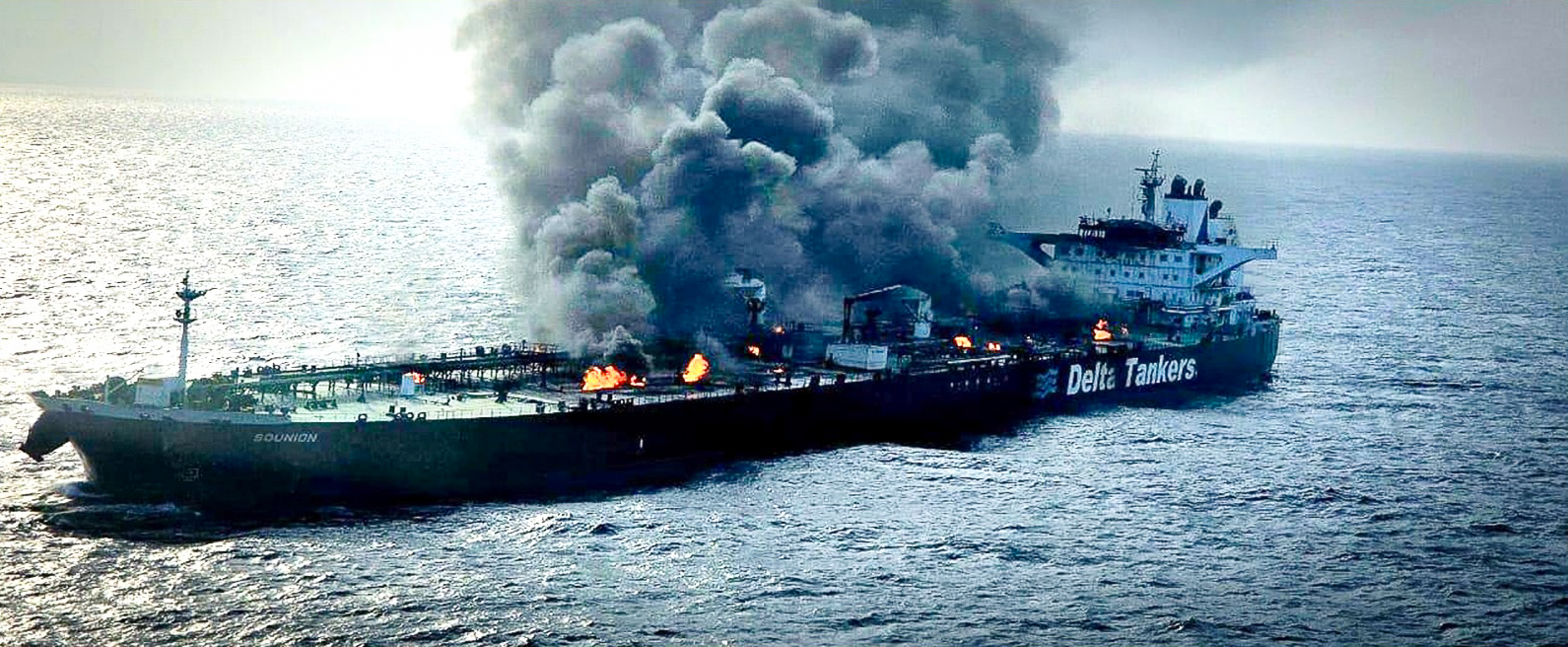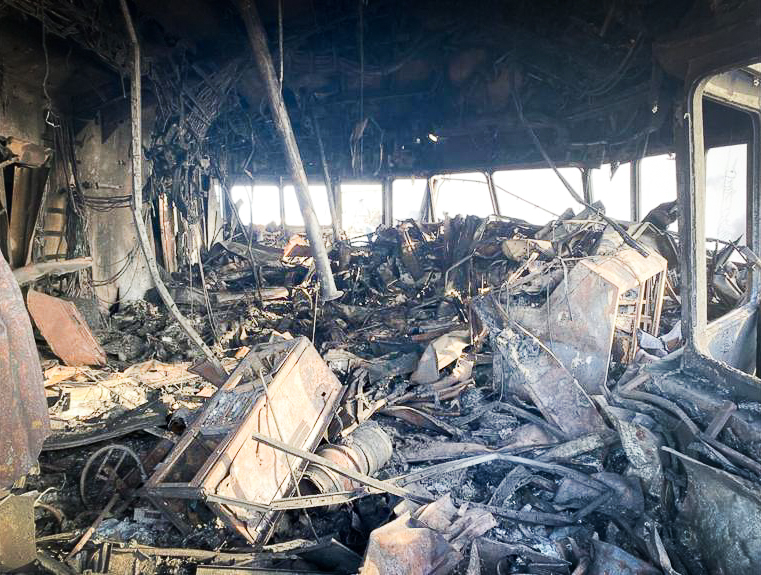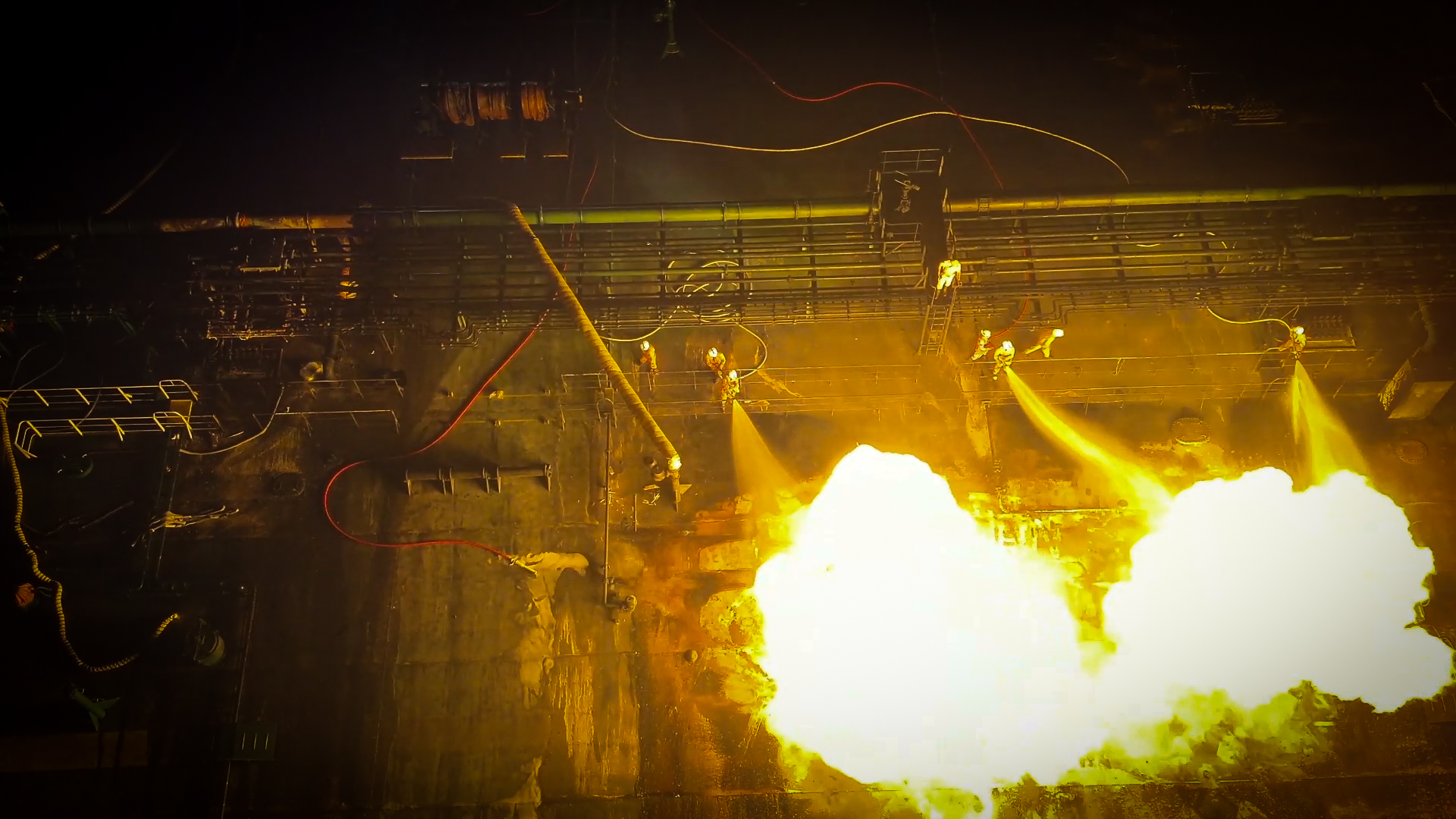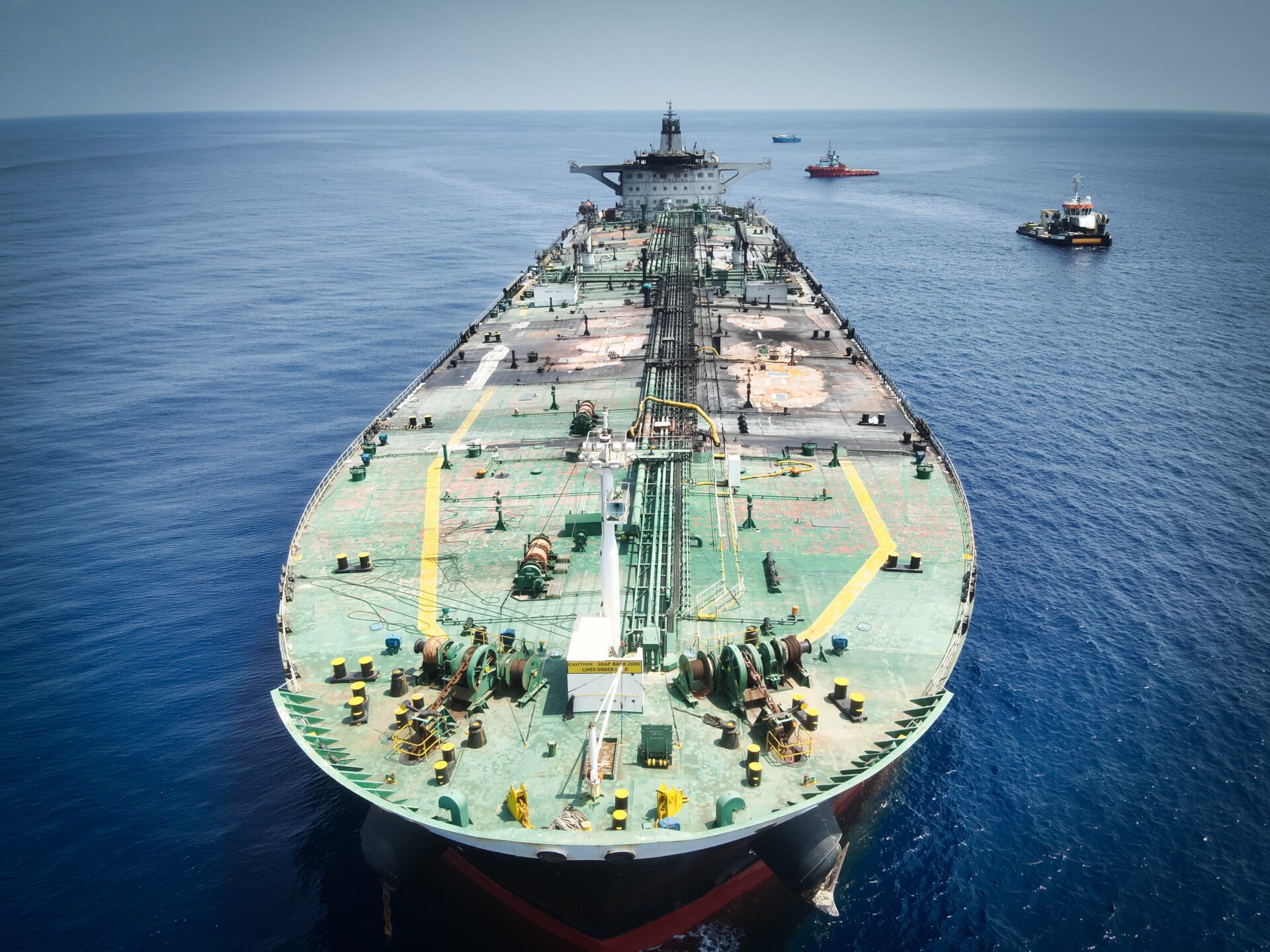
SOUNION
Saving the SOUNION: A Complex Salvage Operation within a War Zone
On August 21, 2024 – A dramatic sequence of events unfolded in the Red Sea when the Greek-owned SOUNION oil tanker was targeted, attacked, and boarded by Houthi militants, who left her stricken 58 miles off the Yemeni coast. The attack raised alarms over a potential environmental disaster, as the vessel carried nearly one million barrels of crude oil. The swift and coordinated international response, which included maritime security experts, specialist salvage crews, and a high-level international diplomatic effort, helped avert a major ecological crisis off the coasts of Yemen and Eritrea.
The Attack on the SOUNION
On the morning of August 21, 2024, the SOUNION, a Panamax-class oil tanker registered in Greece, was transiting through the Red Sea, carrying a substantial cargo of crude oil from the Arabian Peninsula to European markets. The vessel had already completed part of its journey, navigating the narrow shipping lanes near the Bab el-Mandeb Strait, a chokepoint for international shipping. As it sailed in international waters, the SOUNION came under assault by missiles fired by the Iranian-backed Houthi rebels.
Strikes from the anti-ship missiles destroyed critical control systems, and the vessel lost propulsion. On August 22, following an urgent distress call from the ship’s captain, the European Naval Force (EUNAVFOR), Operation “ASPIDES,” swiftly dispatched a French frigate to execute a rescue operation of the crew. Despite continued attacks by Unmanned Surface Vessels (USVs) and Unmanned Aerial Vehicles (UAVs), all 29 crew members were safely evacuated by ASPIDES’ asset.

On 23 August 2024, the Houthis boarded the vessel before detonating explosive charges on the main decks and bridge, which started 19 fires and breached her cargo tank tops. A film released online by the Houthis was then widely circulated in international media. The attack’s location raised the stakes: the Red Sea is a crucial international trade route, and a spill of one million barrels of crude oil would have disastrous environmental consequences for the delicate marine ecosystems of the region.
Immediate Reactions and International Response
The news of the attack, boarding, and deck detonations sent shockwaves through the international community. On 24 August the US State Department issued a statement claiming the vessel risked an oil spill into the Red Sea ‘four times the size of the Exxon Valdez disaster.’
A commercial salvage operation was launched by the vessel insurers, which was led by maritime intelligence and security firm, Ambrey. Major diplomatic efforts were required to support the necessary military, security, salvage, and logistics efforts to rescue the vessel before her structural integrity succumbed to the heat of the fires raging onboard, or she continued dragging her anchor and ran aground.
The Complex and The Unknown
With the crew members safely evacuated and the location of SOUNION established, attention quickly turned to the critical task of preventing an oil spill. The extensive firefighting mission required to make the vessel safe could not be undertaken in her initial location. However, a tow of a laden tanker whilst on fire was not something that had ever been undertaken at this scale before. Salvage operations could only begin once explosive ordnance disposal experts had inspected the vessel and cleared it of any unexploded ordnance or improvised explosive devices, her anchor raised, and a primary towing tug put in position.
Due to the unknown critical stability of the burning vessel, an initial attempt to tow her involved a regional salvage team; however, the security situation was a major factor in delay, as SOUNION remained under close watch from Houthi mother ships and in easy range of all their weapon systems. Furthermore, expert analysis and assessment using daily air reconnaissance raised concerns around the level of operational salvage crews and dedicated salvage equipment that was required to tow and cap the fire holes that were burning through the 19 deck holes.
The availability of advanced salvage and firefighting equipment within the southern Red Sea and Gulf of Aden is extremely limited. The scale and complexity of what had happened to SUONION meant that specialist tugs would need to be immediately mobilised from Greece and firefighting equipment flown in on chartered aircraft, along with specialists from around the world. Circumventing normal customs lead times to enable critical equipment to reach the SOUNION in time took diplomatic engagement at the highest levels. The specialists required for the salvage, firefighting, and oil spill response had to be prepared to conduct their already difficult and dangerous tasks in the midst of a war zone.
In parallel, experts began to assess the environmental risks associated with the potential spill. The Red Sea is a sensitive body of water, known for its unique biodiversity, including some of the world’s most pristine coral reefs. A spill of this magnitude would have far-reaching consequences for marine life, fishing industries, and coastal communities.
Race against the clock

In mid-September, a flotilla of seven salvage vessels supported by three EUNAVFOR ASPIDES’ naval assets and close air support successfully reached SOUNION and towed her to a safe and secluded location 150 miles to the north. The protection provided by EUNAVFOR was critical in providing the security required. The assembled crews now had a race against the clock. Firefighting faced huge challenges with the heat and humidity of the Red Sea, meaning operations were primarily conducted at night. Over three challenging weeks, the fires were extinguished, cargo tanks patched and pressurised with inert gas, and the vessel declared safe.

In early October, she was towed north to Suez for removal of her cargo, which Ambrey confirmed on 10th January 2025 had now been successfully completed.
“Ambrey pays tribute and is grateful to all the brave military and civilian partners, suppliers, and crew members involved in this complex salvage operation. The collaboration and dedication from all parties enabled us to collectively prevent an environmental catastrophe, save the vessel, and keep all involved safe. This project is a testament to the true purpose of all those who contributed.”
Christopher Crookall – Ambrey CEO
The project to save the SOUNION was a complex salvage operation inside a sensitive military and security operation, which in the wake of the attack, initiated a broader conversation about the security of global oil trade routes. Attacks on commercial vessels have become more common in the Red Sea since the start of the Israel-Hamas War on the 7th of October 2023. Multiple ships have been targeted during this period, which included the sinking of Rubymar on 2nd March 2024 in the southern Red Sea. The SOUNION attack continued to underscore the threat to both the shipping community and the vulnerability of the global oil supply chain to geopolitical instability.
Houthi Specify Intent
On the 19th of January 2025, the ceasefire between Israel and Hamas came into effect with the release of 3 female Israeli hostages. The Houthi leader, Abdul Malik al-Houthi, announced the group’s willingness to honour the ceasefire in a speech given on the 16th of January 2025. On the 19th of January, the Houthi-aligned Humanitarian Operations Coordination Center (HOCC) issued an email to stakeholders in the shipping industry announcing that the Houthi would cease military operations against merchant shipping in line with the Israel-Hamas ceasefire. Israel-owned or -flagged vessels were explicitly exempted from this cessation of hostilities.
This constitutes the Houthi intent at least until Israel and Hamas reach an agreement on the terms of ‘Phase 2’ of the ceasefire and commence its implementation. ‘Phase 1’ is set to last 42 days from the 19th of January 2025, with an agreement on ‘Phase 2’ to be reached by week 5. The coming weeks will provide the proof of whether the Houthi follow suit with their stated intent. During this period, the threat to all shipping is reduced apart from Israel-owned and -flagged vessels. However, this is subject to flashpoint escalation if the Houthi consider Israel in breach of the ceasefire agreement.
Geopolitical tensions
The attack on the SOUNION on August 21, 2024, has brought to light the precarious nature of global shipping routes, particularly in politically unstable regions like the Red Sea. While the swift response to evacuate the crew and the successful salvage operation prevented a major environmental disaster, the event serves as a wake-up call for international cooperation on maritime security and environmental protection.
As tensions continue to simmer in the region, the international community faces ongoing challenges in balancing security concerns for a major global shipping channel with the need to protect one of the world’s most vital and vulnerable marine ecosystems. The SOUNION incident has shown that while crisis response mechanisms can be effective, it is the long-term commitment to international diplomacy, cooperation, and environmental stewardship that will ultimately determine the region’s future stability.